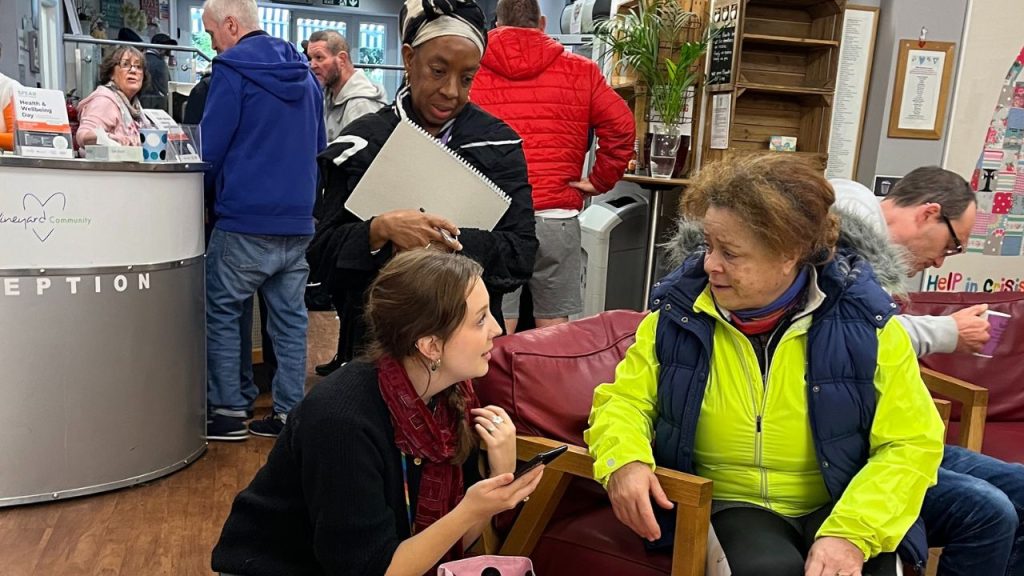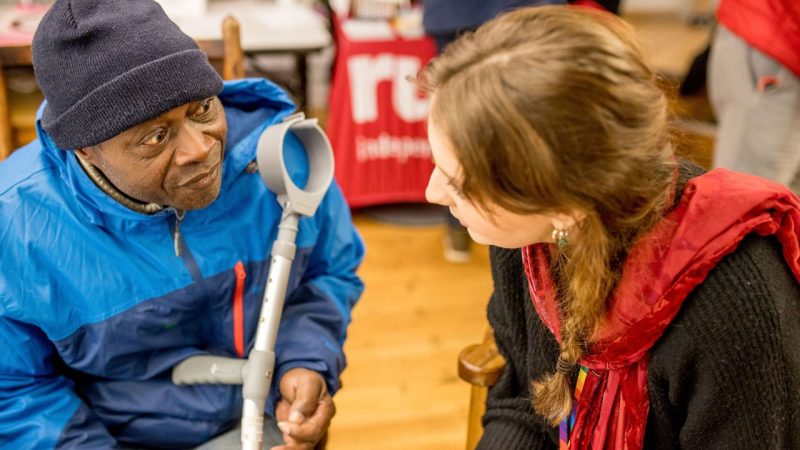Unless you’ve experienced rough sleeping, there are things you may not know about the sharp end of homelessness; that waiting inside a busy hospital for medical treatment can feel unbearable, that seemingly aggressive behaviour is often a result of pain from sleeping on hard floors, or that feeling invisible to the rest of society is one of the worst things about living on the streets.

Based in Wandsworth, Grace Kettlewell is a health link worker for the south west London charity SPEAR. Grace talks about the issues faced by people experiencing homelessness and how she supports them to get the care that is vital to their wellbeing and future independence.
Tell us about your Job
I support people with current or historic experience of homelessness to access health services – GPs, hospitals, mental health and drug and alcohol support – by going along to appointments and advocating for them. I often refer people to social prescribing link workers too, or community kitchens and workshops – services that help their wellbeing.
Why is your role so important?
Health services aren’t always geared up to people who are rough sleeping. In hospitals, for example, if you miss two appointments you are discharged. It’s very difficult for our service users to get to appointments on time, their lives are often so complex.
What’s your background?
My undergraduate degree was in psychology, and I have a master’s in clinical psychology. Previously I’ve worked in a special needs school and in an A&E department during Covid. Through that I witnessed the difficulties people who are rough sleeping have with accessing healthcare and how that affects their future.
What sort of difficulties?
Waits in A&E are a most common problem. Very entrenched rough sleepers find it uncomfortable being inside for long periods. It can feel overwhelming to be around so many people, particularly if they feel judged by other patients. If they are experiencing substance misuse issues, waiting is not comfortable or achievable, meaning they leave before getting treatment. For most of them, A&E is their way into services, but there are so many barriers; how difficult they find it to be in that environment and the preconceptions that still exist about people who are homeless or dealing with addictions.
How could we fix that?
More training for health professionals would be hugely helpful, and more awareness of the difficulties. The way people act is often pain-related. They come across as frustrated or aggressive, which can be distressing, but understanding that it comes from a place of hurt can help.
Tell us more about SPEAR
As a charity we promote independence by helping people regain their lives. We do outreach work to identify rough sleepers and we offer housing support, helping them maintain tenancies. People are referred to me by our outreach teams with the ultimate goal of managing their own health and feeling comfortable using NHS services.
What are the health issues your clients face?
People’s health problems don’t always get addressed quickly enough before they develop into something that is complicated. For example, if they have a growth, they are often reluctant to have it checked out and we’ve seen instances of people who’ve been diagnosed with cancer. It may have been there for a long time, but some people don’t feel able to access services for a whole number of reasons.
How has the picture changed since the pandemic and cost of living crisis?
I think some things have got worse. A lot of people have become homeless because of not being able to work during the pandemic. That’s something we’ve noticed. But on the plus side there is more of a push to make services more accessible.
What is the best thing about your job?
It’s watching people regain their confidence and independence. Health is a huge part of that and the first step forward in feeling in control of your life. Being able to help them regain their trust in the world and other people is incredibly fulfilling.
Is there an example of someone who has benefited from your support?
I supported a very entrenched rough sleeper in getting a new wheelchair as his was broken. Being able to have a safe mobility device was essential for him but the process was very complicated as he needed a fixed address. We managed to work around all the barriers, liaising over the handover.
What would you say to people who want to help?
For professionals, I’d say to listen. Everyone is an expert in their own life and experience, so give them the space to talk about themselves and lead their own care choices. For members of the public, a big thing we hear is that people feel they are invisible. They lose such a sense of themselves when they lose their home. Even if you don’t feel comfortable engaging with someone, acknowledgement is hugely important, even if it’s just a smile.
Find out more about SPEAR and its work in south west London.
Read how SPEAR’s work with NHS South West London, supporting people to manage their health via the NHS app, means another step towards independence.
